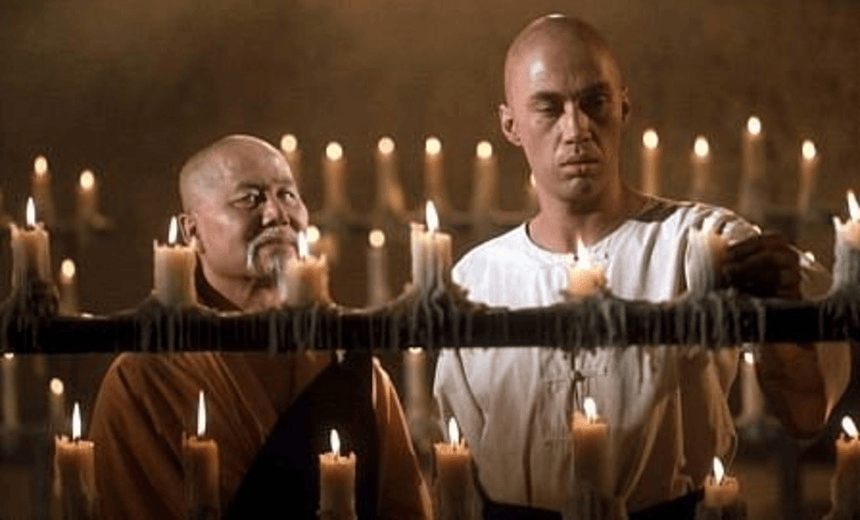Steve Braunias watches a deeply morbid episode of meandering ’70s action-adventure Kung Fu. Warning: content may be disturbing.
Every second Wednesday my daughter and three of her pals come over to the house after school before their dance lesson, and they always ask for macaroni and Kung Fu. I tape it from the Jones Channel and one day I played them the famous opening sequence – “When you can take the pebble from my hand, it is time for you to leave.” They loved it, and asked to watch the entire episode. They found the whole thing strange and captivating, a barefoot Shaolin priest very calmly kicking people unconscious.
But I had to fast-forward because the episode showed David Carradine, as Kwai Chang Caine, about to be hanged. The girls are nine. They love the kung fu and the moral fables told in flashback to Caine when he was a boy at the temple – the sly, blind Master Po tells him aphorisms while lighting candles. They’re too young for hanging.
When they left for dance, I went back to the episode and watched the hanging.
Jodie Foster was in it. She was eight years old in 1973, and getting a lot of work; she guested on a lot of shows, including The Partridge Family.
Carradine was 36. He was married to actress Barbara Hershey, who renamed herself Barbara Seagull, and they had a son, called Free. He later changed his name to Tom. There was an incident when Carradine was found walking naked around Laurel Canyon in a stoned daze: he’d taken peyote, and got lost.
Kung Fu made Carradine a star. He was perfect for the role. He played Caine with a kind of sleepiness, or indolence. Slow-motion was the new big thing on American TV junk – the Six Million Dollar Man ran like a tortoise – but they didn’t need any tricks to sedate Caine. He was a character at peace. He inhabited stillness.
Carradine made flutes out of bamboo that he planted on the Warner Brothers lot, and tooted on them in the show. It was Carradine’s idea to go barefoot: “Caine doesn’t need shoes,” he told producers.
“I’ll walk the earth,” Jules (Samuel L Jackson) tells Vincent (John Travolta) in Pulp Fiction. “Meet people. Get into adventures. Like Caine from Kung Fu.”
Caine meets Jodie Foster’s character in the woods. She’s playing the mandolin. They chat a while, and become firm friends. But when a stagecoach is held up, and a man is killed, she falsely accuses Caine. He’s arrested, and sentenced to death.
Death was one of the recurring themes of Kung Fu. There was the episode when a farmer pointed a gun at a man who stole his pig and threatened to kill him. Caine said, “Will his death return it?”
Life was sacred. In another episode, a disturbed Catholic asked Caine, “Are you a witch?”
Caine: “I am a priest.”
Disturbed Catholic: “A priest! Of what faith? What do you worship?”
Caine: “Life.”
Carradine poured his earnings into a movie he filmed with Hershey, or Seagull, in Kansas. It took nine years to complete. Americana was given its world premiere in 1982 at the Midcity cinema complex in Christchurch; Carradine attended, and left an impression of his palms in wet concrete on Hereford St.
They loved it at Cannes but they hated it in the US. Carradine later remembered reading the reviews and running to the bathroom to vomit.
“If I worry,” Caine once told a character played by Henry Darrow (the sensual Manolito Montoya from High Chaparral), “will the future change?”
The hanging scene is extensively prolonged. It’s filmed in complete silence. There’s no dialogue, no background music. A shaking hand-held camera gets up close to Caine, and the sheriff and the hangman. The noose is put around Caine’s neck.
There are strange angles, and the editing is fast, sudden, lurching. Death is the theme, but there’s something else at work. There’s a sense of ceremony.
Kung Fu was contemporary with the peak years of John Denver, who also brought a particular kind of wisdom and message of peace to middle America. Like Carradine, who was a subtle, inventive actor, Denver practised a very fine craft. His songwriting included the pellucid “Sunshine on my Shoulders”, and probably the best song about the Vietnam War, “Leaving on a Jet Plane.” His first hit album was in 1971. Poems, Prayers & Promises has “Sunshine” on it, and a terrible cover version of “Let It Be”.
But it also has a sensitive version of “Fire and Rain”, and there’s a remarkable moment in it, when Denver slows the song down, and very carefully, very deliberately caresses the line, “Sweet dreams and flying machines in pieces on the ground.”
He was killed on October 12, 1997, in a plane crash. Denver was the pilot. He was low on fuel. Twelve witnesses saw the aircraft in a steep nose-down descent, and six of them saw it hit the water. He was 53.
Death, and deaths foretold: in the Kung Fu episode with Jodie Foster in it, her character stops the hanging at the last moment – she suddenly screams that she made it all up, that Caine is innocent. The noose is removed. He almost looks disappointed. There’s no relief. What kind of ceremony was being played out? It’s like an intense pleasure – something sacred and profound – was interrupted.
A chambermaid at the Park Nai Lert Hotel in Bangkok discovered Carradine’s naked body on June 3, 2009. He was 72. Police said that Carradine was found slumped in a closet with a rope around his neck and his genitals.
“Reach out,” Master Po told Caine, “but be wary of what you allow yourself to grasp.”


